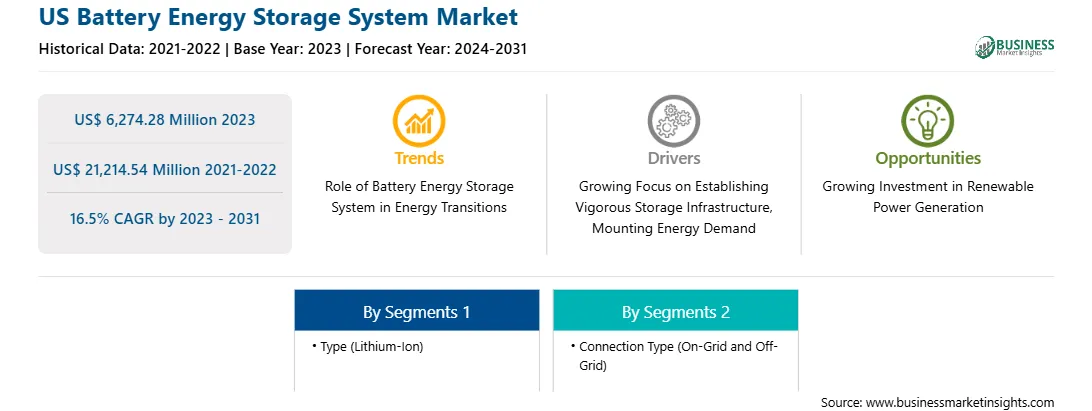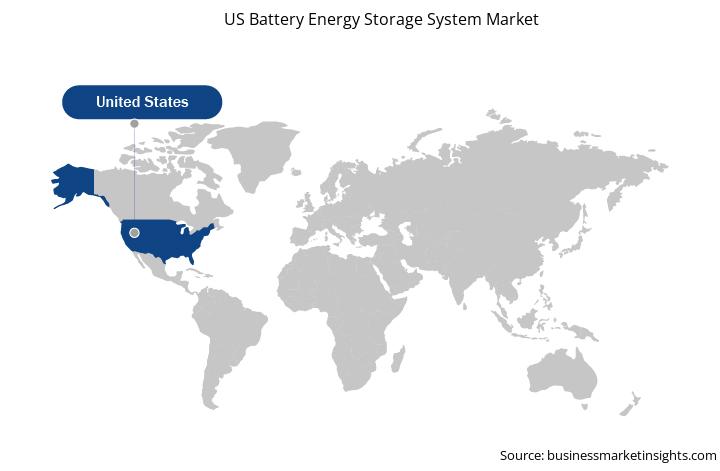美国电池储能系统市场规模和预测(2021 - 2031 年)、区域份额、趋势和增长机会分析报告范围:按类型(锂离子和其他)、连接类型(并网和离网)、最终用户(商业、公用事业和住宅)和国家/地区
No. of Pages: 121 | Report Code: BMIRE00030580 | Category: Energy and Power
No. of Pages: 121 | Report Code: BMIRE00030580 | Category: Energy and Power
Strategic insights for US Battery Energy Storage System involve closely monitoring industry trends, consumer behaviours, and competitor actions to identify opportunities for growth. By leveraging data analytics, businesses can anticipate market shifts and make informed decisions that align with evolving customer needs. Understanding these dynamics helps companies adjust their strategies proactively, enhance customer engagement, and strengthen their competitive edge. Building strong relationships with stakeholders and staying agile in response to changes ensures long-term success in any market.

| Report Attribute | Details |
|---|---|
| Market size in 2023 | US$ 6,274.28 Million |
| Market Size by 2031 | US$ 21,214.54 Million |
| Global CAGR (2023 - 2031) | 16.5% |
| Historical Data | 2021-2022 |
| Forecast period | 2024-2031 |
| Segments Covered |
By 类型
|
| Regions and Countries Covered | 美国
|
| Market leaders and key company profiles |
The regional scope of US Battery Energy Storage System refers to the geographical area in which a business operates and competes. Understanding regional nuances, such as local consumer preferences, economic conditions, and regulatory environments, is crucial for tailoring strategies to specific markets. Businesses can expand their reach by identifying underserved regions or adapting their offerings to meet regional demands. A clear regional focus allows for more effective resource allocation, targeted marketing, and better positioning against local competitors, ultimately driving growth in those specific areas.

The List of Companies - US Battery Energy Storage System Market
The US Battery Energy Storage System Market is valued at US$ 6,274.28 Million in 2023, it is projected to reach US$ 21,214.54 Million by 2031.
As per our report US Battery Energy Storage System Market, the market size is valued at US$ 6,274.28 Million in 2023, projecting it to reach US$ 21,214.54 Million by 2031. This translates to a CAGR of approximately 16.5% during the forecast period.
The US Battery Energy Storage System Market report typically cover these key segments-
The historic period, base year, and forecast period can vary slightly depending on the specific market research report. However, for the US Battery Energy Storage System Market report:
The US Battery Energy Storage System Market is populated by several key players, each contributing to its growth and innovation. Some of the major players include:
The US Battery Energy Storage System Market report is valuable for diverse stakeholders, including:
Essentially, anyone involved in or considering involvement in the US Battery Energy Storage System Market value chain can benefit from the information contained in a comprehensive market report.